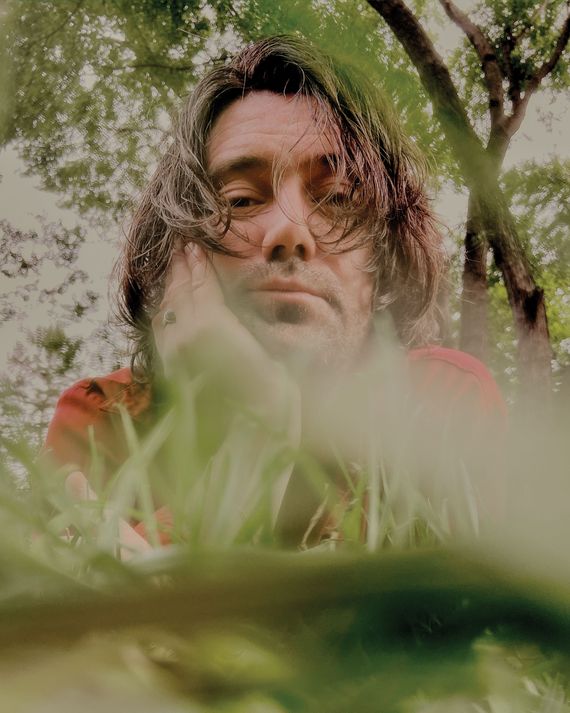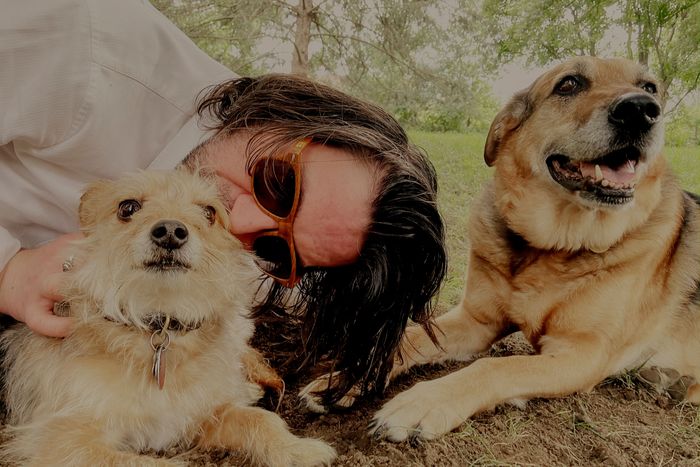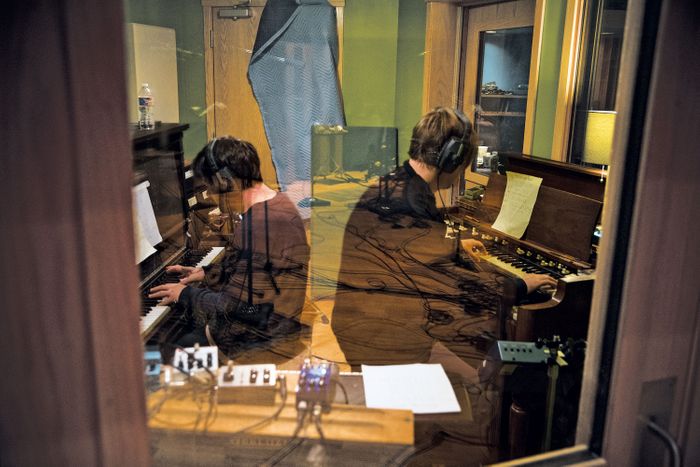
I have these weird bouts of insomnia,” says Conor Oberst, sitting in his living room in Omaha, his hometown. “Usually, it’ll pass.” At 40, the indie-rock elder has a youthful air, but today he looks beat. For three days in a row, he has been sleeping just two hours a night. Still, he’s in good Midwest humor. At least the weather’s nice, he says.
Lack of sleep aside, Oberst appears healthier than the “nicotine-stained” front man who last spoke to this magazine four years ago, following a 2015 health scare that forced him to cancel a tour with one of his bands, Desaparecidos, and return to Nebraska to rest. This year was meant to be a comeback of sorts — right now, he should be on tour for the first Bright Eyes record in nearly a decade. Though all three members of the influential aughts indie-rock band have collaborated over the years, Down in the Weeds, Where the World Once Was was billed as a reunion. It seemed like they’d picked a good year: 2020 marks the 20th anniversary of Fevers and Mirrors, a formative album for many of their fans, now too in their 40s. It’s also the 15th anniversary of the glitchy Digital Ash in a Digital Urn and the folkie I’m Wide Awake, It’s Morning. The new album had been in the works for years, and there were plans for promotion and touring. COVID-19 wiped all that out. The record almost got lost as well. “If we would have been trying to finish [mastering] two months later, it just wouldn’t have gotten finished,” Oberst says. He doesn’t sound bitter about losing all those years of planning. “The first couple weeks, I was feeling sorry for myself,” he recalls. But in the context of a crumbling economy that has forced three-fourths of his friends into unemployment, he decided a Bright Eyes reunion doesn’t matter much.
After spending the initial months of the pandemic in his adopted home of Los Angeles, Oberst drove back to Omaha to see his family and check on his house. Being home felt nice, he says, especially reuniting with the two dogs he shares with his ex-wife, Corina Figueroa Escamilla. (“She’s my best friend,” he says, noting that they see each other all the time.) The pandemic prompted the shutdown of the local bar he co-owns, Pageturners. “Pageturners Rag,” recorded partly at the bar, is the new album’s opening track and its most adventurous — a surreal, Erik Satie–like take on Dixieland with a monologue in Spanish by Corina and a conversation Oberst had with his mother while on mushrooms. It’s a tribute to the Thursday-night ragtime performances of his friend Dan McCarthy, who plays piano on the track. “I always associated that with happiness,” Oberst says about those evenings.
Just a few years ago, a Bright Eyes reunion was not a given. In 2015, Oberst was hospitalized during a tour that followed a nearly career-ending rape accusation (the accuser later recanted). The next year, he released Ruminations, a solo album made up of some of the grimmest music of his career. Oberst is still on the high-blood-pressure medication he started taking around the time of writing Ruminations, and his brother died before the release of that album’s follow-up, 2017’s Salutations, a full-band reimagining of Ruminations. Oberst refers to this time as “the whole situation.” “I just kinda moved on,” he says quickly. “There’s nothing more to be said about it.” On a separate call, his bandmate Mike Mogis is more blunt. “[Ruminations] could have been mixed in a day,” he says, “but it took like two weeks because he was so fucked up all the time.” Mogis is thankful to be making a new Bright Eyes record with Oberst as he is now. He credits Better Oblivion Community Center, Oberst’s well-received 2019 musical partnership with Phoebe Bridgers, as a turning point; for once, he didn’t need to be totally in charge.
There is a temptation to mark the new Bright Eyes album as Oberst’s victory lap after a few wilderness years, but what’s most notable about Down in the Weeds, Where the World Once Was is that it’s not just a showcase for him — it’s a course correction to the idea that Bright Eyes is synonymous with the front man and not also his bandmates, Mogis and Nate Walcott. “It was a great joy working with him, because he was in a place of being really receptive to ideas,” says Walcott, “wanting to use music in whatever way possible in that collaborative way.” On past records, Oberst would often bring in songs for the other two to make prettier. On Down in the Weeds, everyone contributed musical ideas and fleshed them out together. “If it’s going to be a Bright Eyes record, all three of us have to be equally happy with it,” says Oberst.
Bright Eyes albums are defined by their bigness — big feelings, big sounds, big screams. In other words, they’re classically emo. That bigness, how Bright Eyes songs make you feel, comes from Mogis and Walcott. Down in the Weeds is another big Bright Eyes album. The touchstones of each of their records are here: Walcott’s orchestral compositions, the hyperaffected drums and blown-out acoustic guitars, Oberst’s screams and quivers, an opening track that’s some type of monologue or sound collage. “I was trying to find the balance of having to fit this into the Bright Eyes catalogue,” says Oberst, “where if the records are up on a shelf, this one doesn’t seem like a sore thumb, but also have it reflect where we’re at.” It’s an album he hopes will still sound good in 20 years.
Oberst has grown out of the desire to be alone in the spotlight, and he sounds relieved to know the world isn’t looking to him to write music that speaks to the current moment — a task that may have inspired him in his 20s but now appears to be exhausting. He’s aware that it’s a great time to write new songs, though he hasn’t picked up a guitar in a while. “I have had no motivation,” he says. He hasn’t been impressed with all the quarantine-themed music, either. “I get the impulse, but I haven’t heard one that moved me. It’s sort of like stating the obvious,” he adds. “Maybe I’m wrong. Maybe one will come out that’ll sum it all up.” In the meantime, he’s content with not having to pretend he cares about the conversations on the internet.
And yet, one of the most interesting things about Bright Eyes today is how the band has managed to maintain its relevance. Its first album was released around the debut of LiveJournal in the late ’90s, and each that followed arrived at a significant point in the indie genre’s evolution — how it went from a marker of one’s place in the industry (being an independent musician), to a sound (just look at how many mediocre Myspace bands have attempted to replicate Oberst’s tremulous voice), to a template other artists could use (Taylor Swift announcing her indie album). There are more visible Bright Eyes fans now across age groups and genres that aren’t normally associated with Oberst. Rapper Young Thug sampled “First Day of My Life” on 2017’s “Me or Us.” The late Lil Peep used Bright Eyes on “Worlds Away,” a love song as bleak-sounding as some of Oberst’s earliest music, written when he was Peep’s age. (“That’s some Rimbaud shit,” says Oberst of the late rapper.) Bridgers, the current figurehead of sad indie folk, is a vocal Bright Eyes disciple. And Post Malone used his March GQ Style cover story to talk about how much he idolizes Oberst. “I’m Wide Awake, It’s Morning is probably one of the saddest [albums],” Malone said. “I sit there, and I’m drinking and crying my fuckin’ eyes out to that shit.”
Today, indie and emo music are less signifiers of white dudes afraid of their feelings and more an umbrella for all musicians to express different kinds of sadness — in 2020, someone can call Drake emo and be taken seriously. Perhaps what makes Bright Eyes feel timeless is that its music has never felt exclusively tied to white male angst. Oberst compares his songs to composite sketches. “There obviously is an autobiographical bent because I’m the one writing,” he says, “but I always think the pronoun doesn’t matter that much. If I’m singing he, she, I, or you, that’s not really the gist of the lyric.” In a sense, all the band’s music is about some kind of internal terror: Life is strange and frightening no matter who you are, and it’s weird to have feelings. Bright Eyes songs, especially when you’re a certain age, sound as grandiose and all-consuming as your first heartbreak, and they work in good times and bad. Heartache hurts when you’re 22 and when you’re 42. A Bright Eyes song will age with you.
*This article appears in the August 17, 2020, issue of New York Magazine. Subscribe Now!



